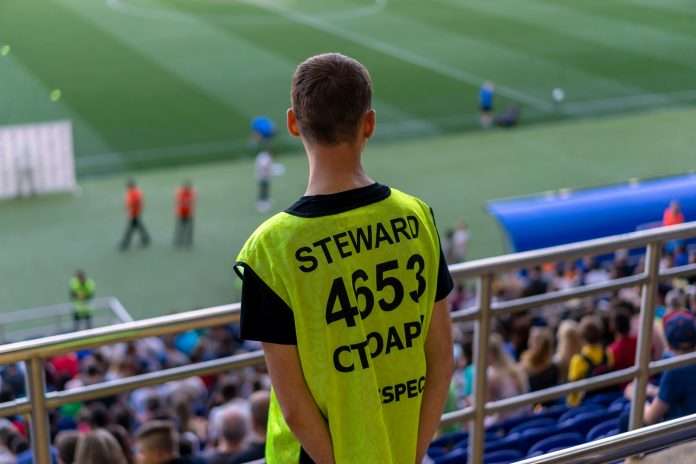In this interview, Dr. Kamilla Swart, Associate Professor and Director of the Master of Science in Sport and Entertainment Management (MSEM) at the College of Science and Engineering (CSE), Hamad Bin Khalifa University (HBKU), discusses the importance of leveraging the gains of the FIFA World Cup in sport security, integrity, and good governance.

She highlights CSE’s efforts to support the country’s positioning as a major international sport hub, including knowledge-driven partnerships and its leading role in the first-ever UNESCO Chair on Governance and Social Responsibility in Sport.
How will Qatar ensure a safe, secure edition of the FIFA World Cup?
Qatar, like former host nations, has had to take into consideration wide-ranging threats and
hazards, natural or man-made, when planning the tournament. However, the burden was even greater, being the first FIFA World Cup hosted amid the COVID-19 pandemic.
In the lead up to this mega-event, Qatar demonstrated its ability to host major international sport events at a time when many others were postponed or canceled. Qatar showed the possibility of resuming international football in a safe and secure manner with the hosting of the 2020 Asian Football Confederation (AFC) Champions League matches and the FIFA Arab Cup. The country also managed to attract other international sport events such as the 2020 Formula One Grand Prix, securing a 10-year contract commencing 2023.
The successful hosting of these events cemented Qatar’s track record and built confidence,
among players and fans alike, that a safe return to in-person attendance was possible provided the correct measures were in place and communicated accordingly. To date, Qatar has been able to showcase its resilience in dealing with crises and disaster management and it is imperative that the same robust approach be taken for the upcoming FIFA World Cup and all future events.
On the other hand, in some parts of the world concerns remain around safety and security due to the perceived threats of terrorism in the Middle East, albeit that Qatar is recognized as one of the safest in the region. The successful hosting of the FIFA World Cup 2022, from a safety and security perspective, will go a long way to dispelling some of these perceptions.
Consequently, Qatar will be able to further enhance its reputation and global standing. What becomes important is leveraging the gains made in the post-FIFA World Cup period.
What is CSE’s role in promoting sport security, integrity, and good governance?
CSE is committed to driving the agenda towards a more socially responsible sport industry
through our programs and in cooperation with our partners. Through our networks, we
promote good governance and accountability across all levels of sport and use joint resources, expertise, and knowledge to influence policy and practice.
Our integral role in knowledge creation and the transfer of that knowledge through rigorous, applied research endeavors aims to capture lessons learned for the future planning and management of sport, globally, regionally, and locally.
How will HBKU’s recently-signed MoU with the International Centre for Sport Security (ICSS) help expand CSE’s role as a hub of expertise in this field?
HBKU’s strategic partnerships, with the ICSS and other bodies, create opportunities for CSE to collaborate and share resources, expertise, and knowledge that contribute to safeguarding sport at all levels. In turn, this aspect is vital to mobilizing collective efforts. Working with the ICSS, whose programs focus on safety, security, and integrity issues facing sport among other areas, CSE can jointly address areas of concern for governments, sport federations, and industry stakeholders. These include health-related threats, cybersecurity in sport, and working towards building a more resilient sport and entertainment industry at all levels.
As an example, HBKU is collaborating with the ICSS and partners, including the UN Institute for Training and Research and the World Health Organization, to develop an advanced education and training program focused on addressing pandemics and disaster management in the context of major sporting events.
What are CSE’s other partnerships?
HBKU has been working on several fronts to bolster Qatar’s emerging role as a major international sporting hub. When it comes to our academic programs, our MSEM is a joint degree with the University of South Carolina whose program has been ranked fifth worldwide in the 2022 ranking by Sport Business International. It is the first graduate sport management degree in Qatar and one of a few in the region.
HBKU and Qatar University (QU) will be co-hosting the World Association of Sport Management (WASM) Conference in March 2023 – the first WASM to be held in the Middle East and North Africa. Under the theme, “Bringing the World Together: Global and Local Perspectives”, the conference will provide an ideal platform to develop mutually beneficial partnerships and enrich local research and innovation capability.
HBKU has partnerships with local entities like BeIN and Aspire, and we hope to expand a joint project with the 3-2-1 Qatar Olympic and Sports Museum, working with QU and the International Physical Literacy Association. We are finalizing partnerships with the Qatar Olympic Committee (QOC) and Qatar Stars League, among others. These span research, education, and training to develop a competitive and sustainable sport industry.
Our collaborations also go beyond sport organizations. CSE’s agreement with Gulf Warehousing Company (GWC), the official logistics partner for the FIFA World Cup 2022, enables joint research opportunities aimed at establishing a logistics and supply chain legacy for the country.
A new UNESCO Chair in Sport has been established at UCLan. What is CSE’s supporting role?
CSE faculty are very active in strengthening knowledge-intensive academic networks with global impact, and our support of the first-ever UNESCO Chair on Governance and Social Responsibility in Sport – which UNESCO awarded to the University of Central Lancashire
(UCLan), Cyprus in June 2022 – demonstrates that commitment.
Dr. Christos Anagnostopoulos, the Founder, Director, and Co-Chairholder of the Chair, has since joined HBKU as an Assistant Professor in Sport Management at CSE. HBKU has a unique opportunity to contribute to the objectives of the Chair as he carries out his role from here.
I am supporting the Chair as an appointed member of the Scientific Committee, the Chair’s
consultative authority. I am co-leading the ‘Research Strategic Pillar’. With Dr. Anagnostopoulos now based at HBKU, academics in Qatar have an opportunity, through the UNESCO Chair, to play an important role in research and educational initiatives that influence sport policy and practice globally and contribute to good governance and accountability across all levels of sport.

















